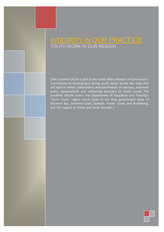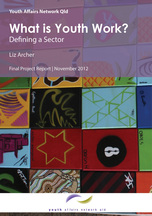
| integrity_in_our_practice_final_18-6-13.pdf |
 The Sunshine CPLAN began with a focus on the youth organisations in the three regional councils in the south of the region: Moreton Bay, Sunshine Coast and Gympie. In May 2011 about twenty youth organisations from across this area began meeting to develop their CPLAN. One of the key focus areas was ‘What would it take to create a vibrant youth sector in this region?’ To respond to this question, the Sunshine CPLAN members felt that it would first be valuable to create a foundational document that would provide all youth organisations across the region with an articulation of their shared values and common practice, and provide a clear expectation for youth work practice and service delivery in the Sunshine region.
1 Comment
 In early 2009 YANQ began a major youth sector workforce development project. This project was designed to develop a sustainable and vibrant youth sector workforce in Queensland, which protects and promotes young people's rights. Before we can promote the sector, it is essential to know what we are promoting – that is, to have a clear definition of youth work and its place in the youth (services) sector. This report details the definition created through a two year consultation process with the youth sector. Download the Full Report Download the Summary Sheet The following report is based upon data collected from a survey administered by the Youth Affairs Network of Queensland (YANQ) in September and October 2012. Those surveyed are members of YANQ and provided their responses on the condition of confidentiality. This report has been used in advocacy to the Queensland Government.
Click to download the Consultation Report
This report would not have been possible without the detailed consideration and input provided by over 80 participants at YANQs “What is Youth Work” consultations held in March 2012. Workers’ honesty, straight talking and genuine commitment to young people shone throughout, even where they expressed differences of opinions. It was a privilege, in particular, to work alongside Steve Fisher, YANQ's Murri Project Officer, and to listen to and record the perspectives of Murri and other First Nation participants. A lot of people told me to write this report in clear English, with a minimum of “jargon” or technical language and remain focused on the “real” nature of working with young people. I hope I’ve managed to do this and to reflect everyone’s views. Sincere thanks to all participants for taking time from busy schedules to contribute their ideas, especially those who also promoted and helped organise each session in their own region. "The Murri Youth Sector in Queensland" report outlines the conduct and findings of a significant research project undertaken with Murri youth services in three parts of Queensland. It presents a summary of themes and draws attention to some of the possibilities for future actions and research that have emerged from an evidence base that has not previously been documented on the profi le and demographics of this sector.
Download the report here: Murri Youth Sector in Queensland report By Melissa Lucashenko (Yugambeh)
During 2009 YANQ conducted research into youth work in Queensland. The Murri part of the research asked youth workers, managers and volunteers (both Murri and Migaloo) what they thought were the key values for doing this kind of work well. The researchers were told that some of the important values underlying Murri youth work were:
This Discussion Paper is about what youth work actually means in Murri culture, why values are important, and what difference it makes to youth work to have these Murri values in mind. Download the Paper here. We look forward to receiving your feedback on this discussion paper. Please send your response to director at yanq dot org dot au. This report, The Youth Sector in Queensland, outlines the conduct and findings of two significant research projects undertaken with youth services in Queensland. It presents a summary of themes and possibilities for future actions and research that have emerged from an evidence base that has not previously been documented on the profile and demographics of the youth sector in Queensland. The Youth Services Workforce Skilling and Training project explored workforce development issues and topics with the Department of Communities and Reconnect funded youth services workforce in south west and south east Queensland. The report also contains interim data generated from the Aboriginal and Torres Strait Islander Youth Sector Skilling and Training project in Central, North West, Brisbane and Cherbourg areas of Queensland has also been included.
The report contains:
Making decisions in groups (such as interagencies or networks) can sometimes be a very difficult process. If a group you are involved in find making decisions difficult you might find the following documents and links useful. YANQ has published the first two documents to help interagencies that participate in the Youth Consultative Network, though they may be useful to other groups in other situations as well.
By Daniel Allert
The Youth Affairs Network Queensland believes it is necessary to reframe debates about young people's services (such as education, housing, employment support etc) by asserting young people's rights, as opposed to their ‘needs’. It is important to differentiate between these two terms. This is because of the negative impact which the current term ‘needs’ is having on young people in our society by reinforcing negative connotations. Instead, Australia must adopt a “rights culture"1. There are a number of underlying meanings associated with the word ‘need’. Firstly, having ‘needs’ suggests that persons are weak because they require ‘help’2. This is a degrading portrayal of human necessities. It conjures up ideas of the weak and inferior in the same manner we would refer to the elderly, disabled and children. Secondly, the term ‘need’ has become a dirty word because people think a need requires charity and charity requires tax payer’s money. People with needs are portrayed as slackers who can’t support themselves. There are a number of weaknesses inherent in the very meaning of ‘need’ that aren’t immediately obvious. Firstly, because needs can be prioritised and addressed on a conditional basis there is no recourse when needs aren’t met. While the infringement of a need offers no remedy legal remedy in most cases, the infringement of a right does. Secondly, when something is labelled a need, it can be withheld upon minimal justification. Written by Suzi Quixley and Siyavash Doostkhah, in consultation with youth workers in Queensland. Recent debate over whether, or not, to adopt a Code of Ethics for youth work has been characterised by an uncritical assumption that having a code is a good thing …that it will automatically produce more ethical practice or protect against unethical practice. This paper challenges these assumptions and puts an alternate point of view about how ethical practice can be achieved in work with young people.
|
Research PapersYANQ has spent over two decades at the forefront of youth affairs research in Queensland. This page links to all of our research papers and reports since 1991.  All YANQ publications are licensed under a Creative Commons Attribution-NonCommercial-NoDerivs 3.0 Unported License. Categories
All
Archives
September 2020
|
||||||||||||||||||||||||||||||